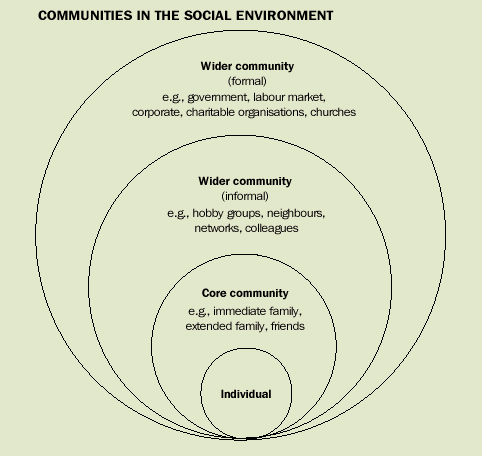Transactions
People are embedded in a web of circumstances that link them to their families and the surrounding community. Individual wellbeing, and the wellbeing of society, are intrinsically affected by this network and the interactions that take place within it. Simply to maintain their own wellbeing or that of family members, people must become involved in transactions with others. Transactions become particularly important when people wish to change their own or their family's wellbeing status. Seen in this way, social transactions are events which change personal and societal wellbeing over time, and are therefore another important element in the system of social statistics. Transactions between community members are also the point at which social capital can be built or diminished. Crime is an example of a transaction that depletes trust, and therefore diminishes social capital; voluntary work is a transaction that increases goodwill between people, and builds social capital.
Transactions, or social exchanges, take place from the moment people draw their first breath. Babies cry to be fed, and parents feed them. Children are nurtured and taught social values, and sick or elderly family members are cared for. Governments deliver health and education services. Social groups provide recreation and a sense of belonging, and religious groups provide spiritual guidance and support. The labour market functions around contracts between employers and employees. A model of transactions is particularly useful within a system of social statistics, as it maps the whole of society, acknowledges the interrelatedness that is at the core of society, and directly addresses the dynamic process by which wellbeing is influenced.
Importantly, whether individuals choose to engage in transactions that improve their wellbeing, or are able to fully benefit from transactions they are a part of, will depend on a complex range of circumstances. Some individuals or families may be caught in a cycle that reinforces low socioeconomic status. For example, people who have been out of work for a long period may undergo a loss of self esteem, which may in turn affect their ability to negotiate a job. A difficult or disadvantaged family background might affect a person's ability to acquire skills or to build healthy relationships. These interlocking factors suggest a reduced 'social capability' which adversely affects wellbeing. The complexity inherent in a loss of social capability requires an approach which lays emphasis on connections and interrelations. A transaction model can be an effective way of ensuring all relevant players, links and interdependencies have been covered.
The transaction model used by the ABS for social statistics begins by identifying the social environments in which an individual can become involved in transactions, and describes these in terms of communities. An individual's core community (most usually their immediate family) is the setting for a person's primary and most intimate transactions, and is determined by which people undertake key functions of a core community, such as the provision of love, comradeship, nurture, care and support, economic security, and guidance on commonly held social values. The wider community encompasses transactions and social exchanges which people undertake beyond their immediate circle of family and friends. Once again, what constitutes the wider community for the individual is determined by the functions performed with or for the individual by other people and organisations. For example, key functions of the formal wider community are to provide the individual with employment and a source of income to satisfy his/her consumption needs, and key functions of the informal wider community are to provide a social and communication network that joins the individual to others with similar interests and values.

- direction, frequency, and efficiency of the transaction (e.g. effectiveness of government support services);
- type of service and benefit provided by the transaction;
- barriers to access to the transaction; and
- effect of the transaction (e.g. whether or not wellbeing is improved).
PROVIDERS AND RECEIVERS
To understand the direction of transactions, the ABS identifies the active parties in the transaction, as either providers or receivers. Obviously there will be many types of providers, and receivers (as individuals or as families/households) will have many different levels of wellbeing and be in a range of life cycle stages. The chapter on family and community expands on this description of the transaction model, and all the chapters give some examples of contracts individuals negotiate between themselves and their community in each area of concern, and the transactions and exchanges these contracts support.
 Print Page
Print Page
 Print All
Print All